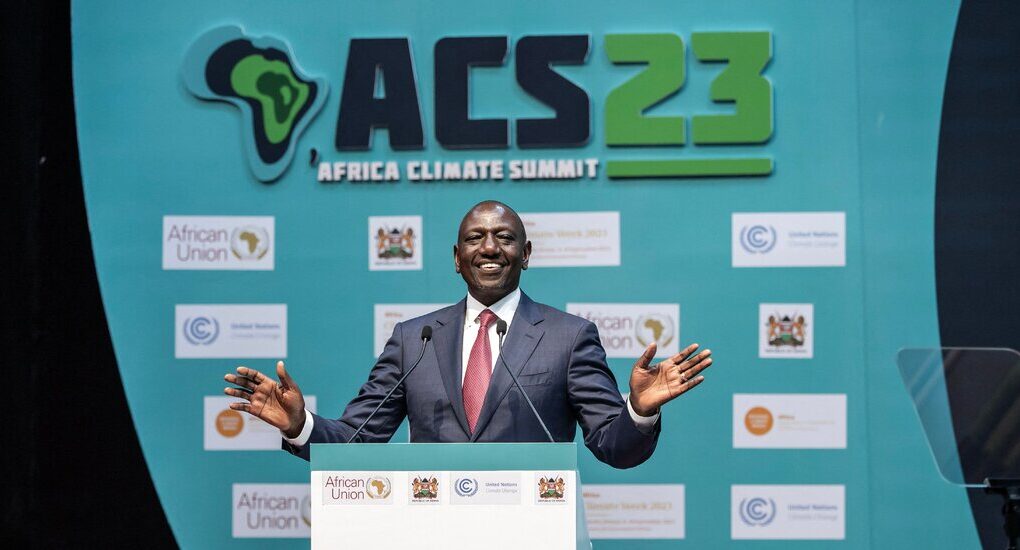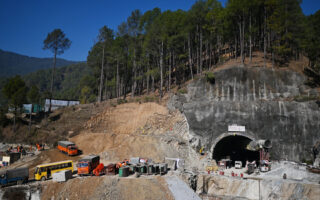He has taken dozens of trips abroad boosting his credentials on climate change, while raising taxes at home. He pledged to send his country’s police to quash gang violence in Haiti, though they stand accused of brutality at home. And he recently hosted an eight-course state dinner for King Charles III, amid skyrocketing food and fuel prices.
Kenya’s president, William Ruto, is facing searing criticism and mounting public anger just over one year since he took power after a tightly contested election. The rising discontent has rattled the East African nation, a close Western ally that has long been an economic powerhouse and a pillar of stability in a tumultuous region.
Mr. Ruto, who grew up poor and attended school barefoot, campaigned on a platform to improve the economy for the millions of striving Kenyans, whom he called “hustlers.” But now, even some of his most ardent supporters say the president, a wealthy businessman, has made life more onerous by imposing higher taxes, removing fuel subsidies and raising electricity prices.
“The president is a liar, a serial liar,” said Antony Ikonya Mwaniki, a former local official in Kiambu County, north of the capital Nairobi, where Mr. Ruto held his final campaign rally last year. Mr. Mwaniki, who had worked closely with Mr. Ruto and his allies, said he’s been apologizing to constituents he had convinced to vote for Mr. Ruto.
“I am a very disappointed person,” Mr. Mwaniki said. “We are all suffering.”
Mr. Ruto initially scoffed at his critics, saying he assumed office when Kenya’s economy was already encumbered by growing debt, high unemployment and a prolonged drought that shriveled crops. He blamed the previous government of President Uhuru Kenyatta — in which he served as vice president — for making poor financial decisions and failing to stem corruption.
The president, whose office did not respond to multiple requests for comment, has given speeches saying that the new measures were aimed at raising funds and limiting borrowing for a country in deep debt. He said his administration had taken steps to cushion the public from escalating costs by reducing the price of fertilizer for farmers, and supporting the dairy and fishing industries.
“We have had to take hard decisions and make painful choices because we owe it to Kenyans to do the right thing,” Mr. Ruto said in November in his first State of the Nation address. “The new direction may not be easy, but it is ethical, responsible, prudent, and most importantly, necessary.”
Mr. Ruto’s plan to charge taxpayers 1.5 percent of their monthly incomes, along with an equal match by employers, to build affordable housing, was declared unconstitutional by the High Court on Tuesday. A separate plan to promote universal health care was also suspended by the court, on Monday.
The president’s detractors say he has primarily spent his first year in office fixated on elevating his global standing and reinventing himself as a Pan-African leader.
He hosted Africa’s first climate summit in September, and was named one of the world’s 100 most influential climate leaders by Time magazine. He delivered speeches calling for the international financial system to deal more equitably with African countries. He tried to mediate between the warring generals in Sudan and to find a resolution to the conflict in the eastern Democratic Republic of Congo. And he invited world leaders to Kenya, including Charles, who made Kenya his first destination in Africa as king.
“Ruto is the blue-eyed boy who wants to be liked,” said Dr. Njoki Wamai, an assistant professor of international relations at the United States International University-Africa in Nairobi. “He is the hustler-in-chief and he has taken his hustle to the international space.”
But at home, activists and human rights groups denounced the plan, saying it violated Kenya’s Constitution because it would place officers in undue danger, and was announced without wider public consultation or the express approval of the government agencies responsible for national security.
Human rights activists also raised concerns about the conduct of Kenyan police, who have been accused of killing at least 107 people this year, according to Amnesty International.
The Haiti plan, largely welcomed abroad, has become a political wedge issue at home. During a heated debate in parliament in November, one lawmaker, Rozaah Akinyi Buyu, said that Kenyan police sent to Haiti would be nothing but “sacrificial lambs.” Other parliamentarians argued that Kenya was obligated to help a country whose people are part of the African diaspora.
“Haiti is not an isolated country for us,” said Yusuf Hassan Abdi, another legislator. “Haitians are of African descent.”
Parliament approved the mission in mid-November. But a judge had temporarily blocked the deployment in October, and is expected to deliver a final ruling in late January.
As Mr. Ruto tries to solve foreign problems, domestic challenges mount.
The annual average inflation rates have risen to 8 percent as fuel, transport and food prices grow. The Kenyan currency has lost about 25 percent of its value against the dollar in the past year. A new tax package has triggered anger and protests. At least 70,000 jobs have been lost in the private sector. And following a devastating drought, heavy rains and floods are now wreaking havoc nationwide.
Esther Kwamboka is the kind of “hustler” Mr. Ruto promised to help.
A 39-year-old mother of four, she runs a small food shop in the Kibera shantytown in Nairobi. She is now working longer hours to make ends meet as the prices of water, electricity, rent and her business license all doubled. With fewer customers and lower income, she worries about how she will afford her children’s school fees next year.
“If the president really cared about us, he would bring the cost of food and doing business down,” she said. “Otherwise, people will start committing suicide soon.”
The rise in the cost of living comes as some of Mr. Ruto’s close allies in his cabinet face allegations of corruption. A recent parliamentary report said that corruption cases had increased by 64 percent between May 2022 and August 2023.
The president has faced disapproval for his foreign travels, too. Since taking office last September, Mr. Ruto has traveled to more than two dozen nations, hobnobbing with political leaders in Africa, Asia and Europe, as well as in Silicon Valley, with business leaders like the Apple CEO, Tim Cook.
The travel budget for the president’s office increased by over 40 percent between July 2022 and June 2023, according to the Office of the Controller of Budget, an independent government agency.
Mr. Ruto, 56, has defended his travels, saying he was securing jobs and deals for Kenya. But following a public outcry, he announced a cut in travel spending and the size of government delegations.
“When you are looking at it from the totality of the budget, travel is a small spending,” said Dr. Abraham Rugo, executive director of International Budget Partnership Kenya, a nonprofit organization. But “at a time when you are fiscally strained, then it becomes significant.”
For now, Kenyans hope Mr. Ruto will find a solution to their economic pains.
Even after working 20-hour days, David Odongo, a motorcycle taxi driver, says he is unable to afford enough maize flour for his family. His three daughters and son often ask when he will buy them some meat, or their favorite, fish. He lacks funds to renew the insurance on his motorcycle, putting him at risk of arrest.
“Life has become so hard and painful,” Mr. Odongo, 29, said. “Every day, the government finds a way to take more from us.”



